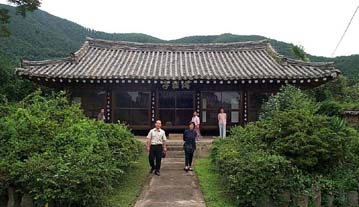 |
Kokan-RiBy Wilson M. PowellSeptember 9, 2000 We sat together on a stone bench holding hands. She was all of four foot two, stocky, dressed in a pink tunic and flowered pants, tiny feet in black, rubber-soled shoes. Her hair is close-cropped and her skin fine-wrinkled and reddened by outdoor living. She was telling her story as the sole known survivor of a mass killing that happened fifty years ago in September 1950. Her name is Hwang Jum Soon She squeezed my hand and rose to lead us through the rice paddy to an ancestral shrine. She said it had come under attack by two groups of American soldiers after about one hundred old people and children took shelter from the war raging around them on that day. She pointed to a grove of trees about 800 yards distant. "They were shooting from there." Then she pointed to a low wall, much closer, perhaps sixty yards off from the shrine, "They were shooting from there, also. Even though they could see we had a white cloth on the roof to say we were civilians." She is speaking through our interpreter, who brought me, by bus, to Masan the night before to meet with Kim Yeong Man, a Vietnam war veteran of the ROK Marines. He is the only one of 300,000 ROK troops who has turned in his medals and publicly apologized for his part in attacks on civilian populations in that country. No one else spoke up - but no other veteran criticized him, either. He hopes he can someday form a contingent of Veterans For Peace in Korea. Yeong Man brought us here, in the cool of an overcast morning, to meet Hwang Jum Soon and listen to her story and her plea for a "fact-finding." She wants to find her son, if he is still alive. Yeong Man says she has been here alone, without family, ever since the killing. He says her husband died just before the attack, but she doesn't know how. He assumes he was shot by someone. She tells more of her story as we approach the shrine, a stone-walled area about one-third of an acre square, with a raised wood and plaster building in the center. We pass through a wide wood gate into the courtyard. The shrine roof is curved tile, typical of the old Korea. Wood frame doors with panels swing open to reveal a highly-varnished wood floor. It looks chewed up in one section and wormy in others. I realize I am looking at fifty-year-old bullet holes: hundreds, perhaps thousands of them. They had come from above and from below. The old woman, now seventy-two, tells how she, as a young mother, was holding her two-year-old son in her arms, trying to protect him as bullets entered her body. She pulls up a pant leg to reveal a puckered scar, very recognizable as a bullet wound. The other wounds were to her chest and arms, covered by the shirt. She said her baby was hit, but not dead, she thought. Not only did they take ground fire, but they were hit from the air. Strafed, she said. She was the only one left alive, except, perhaps, for her son. She was taken away, unconscious, by villagers who came later, after the soldiers left. No one dared come back for fifteen more days. When they did, her son was not among the bodies removed for burial on the mountain behind the shrine. She hopes he was taken, perhaps even by a soldier, wounded as he was, and cared for. She hopes he is alive. Before we leave, she stoops to pull a few weeds. This place is sacred to her, needs her care. On the path back, she takes my hands in both of hers and looks me in the eyes. Through our interpreter, she tells us all that I am the first American soldier ever to come here since the day of the killing. She is very glad that an American veteran cares to come and learn from her. I can only say, "I am so sorry." I am speaking for myself, of course, but I am also speaking for all other veterans who feel as I do: that we need to make amends wherever we can, and to let people know that wars have very personal, very harmful, consequences, are certainly avoidable and unnecessary. I promise to tell her story and join my voice with those who want to expose all such events and give our countries the chance to make official amends - starting, in her case, with an investigation that just might, against all odds, find out what happened to her son.
|



